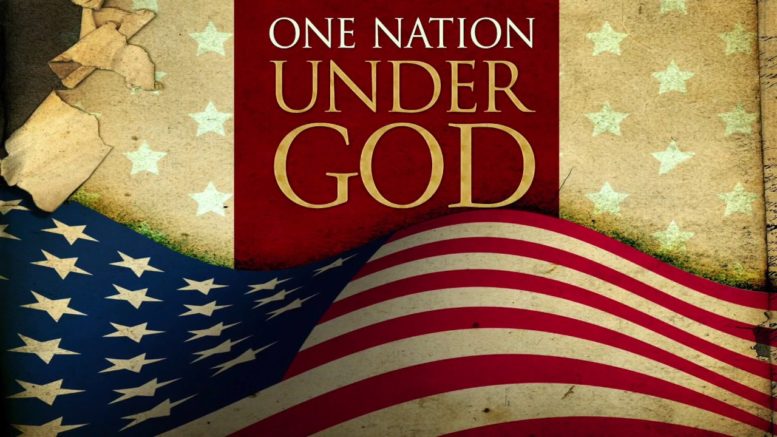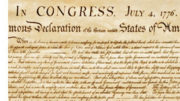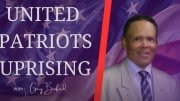Introduction:
While, in this day and age, it is difficult to see the United States as a nation under God, it was once commonplace for politicians to consult their Bibles, for children to pray openly in schools, for the Bible to be taught in public schools, and for the court system to reference the Bible for guidance.[1]
These times have passed. The 1960s brought rampant change to American society, and years since have struck even heavier blows to our nation’s Christian heritage. Something integral to our nation has been lost, and it must be found again if America is to endure as its founders envisioned. This discourse will primarily focus on the United State’s Christian roots by examining the beliefs and practices of its founding fathers, namely George Washington and Thomas Jefferson, among others.
By examining the claims of Thomas Jefferson, in particular, we hope to shed some light on common misconceptions about the meaning of the phrase, “separation of church and state,” and its modern day implications. We will also look at the various ways our nation has fallen from its Christian heritage and how Christians can make a difference.
George Washington
Immense evidence points to the United States’ Christian heritage. Although students, today, are taught otherwise, many of the founding fathers were devout men of God. George Washington, the first Commander in Chief and the first President of the United States, was passionately devoted to his Christian faith, and it played a principle part in his role as the founder and leader of our nation. In his 1796 Presidential Farewell Address, he stated:
Of all the dispositions and habits which lead to political prosperity, religion and morality are indispensable supports. In vain would that man claim the tribute of patriotism who should labor to subvert these great pillars of human happiness – these firmest props of the duties of men and citizens.[2]
In other words, Washington viewed religion and morality as essential to the success of the United States. Washington also spoke of religious devotion in his Thanksgiving Proclamation of 1789: “…[It] is the duty of all Nations to acknowledge the Providence of Almighty God, to obey His will, to be grateful for His benefits, and humbly to implore His protection and favor.”[3]In fact, Washington’s relationship with God was so important to him, he set time aside twice a day every day of the week for prayer. He read from a collection of prayers, his personal journal, titled, “Daily Sacrifice.” Washington fully understood submission to God, and he practiced it daily, setting an example for all who knew him, as well as his fellow countrymen.
He was a firm believer in the Christian theme of freedom. And although a strong Christian, he never imposed his beliefs on anyone. Rather, he “respected everyone’s faith as a sacred God-given personal trust.”[4]Furthermore, he once said, “Every man, conducting himself as a good citizen and being accountable to God alone for his religious opinions, ought to be protected in worshipping the Deity according to the dictates of his conscience.”[5]He believed so strongly that everyone was created equally and deserved freedom that he once said, “I hope someday or another, we shall become a storehouse and granary for the world.”[6]And while it is true that Washington owned slaves, he was also the only Founding Father who set them all free. In fact, Washington treated his slaves better than most people in the 1700s. He refused to separate a family, and his slaves received the best treatment: healthy rations, opportunities for rest, education, and equal status. To Washington, slavery was an unfortunate necessity. He understood that it was wrong, but knew America was dependent on it; it was the only way to run a farm. Without slavery, the new nation’s economy would have crumbled.
Ultimately, Washington knew that reliance on God was central to the success of a free nation. Morality could not function without religion. In his Farewell Address, he warned, “…Reason and experience both forbid us to expect that national morality can prevail in exclusion of religious principle.”[7]
Other Founding Fathers
John Adams, much like George Washington, was outspoken about his Christian beliefs and their importance to the United States. He once said, “The general principles on which the fathers achieved independence were…the general principles of Christianity.”[8]And his son, John Quincy Adams, claimed that the greatest victory won in the American Revolution was that Christian principles and civil government had been tied together in an “indissoluble” bond. Furthermore, John Jay, the original Chief Justice of the U.S. Supreme Court once declared that Providence had given the American people the choice of their rulers, and, therefore, it was in their best interests to select Christians as their rulers.[9]Also, political science professors at the University of Houston discovered, through a study, that “thirty-four percent of the Founders’ quotes came directly out of the Bible.”[10]
Thomas Jefferson and the “Wall of Separation Between Church and State”
The third President of the United States, Thomas Jefferson, held differing views on Christianity than his predecessor, George Washington. Jefferson – it is believed – did not have a personal relationship with God. However, Jefferson believed firmly in the existence of Jesus Christ and put much stock in his moral teachings. Regardless of Jefferson’s personal views, he understood the importance of Christian morality in America. He also believed in freedom of religion. When asked about his official position, Jefferson once said, “I am for freedom of religion, and against all maneuvers to bring about a legal ascendancy of one sect over another,”[11] which brings us to his most famous controversy: the wall of separation between church and state. Over the years, Jefferson’s saying has been misquoted. Even Jefferson was aware of how his statements on church and state were being taken out of context. He once wrote in a letter to Dr. Benjamin Rush, “And in confiding [this] to you, I know it will not be exposed to the malignant perversions of those who make every word from me a text for new misrepresentations and calumnies.”[12]
In order to understand what Jefferson meant by “the separation of church and state,” we must look at the First Amendment, which, in part, states, “Congress shall make no law respecting an establishment of religion or prohibiting the free exercise thereof.” Nowhere in the Amendment or any other founding document is found the phrase, “separation of church and state.”[13] Yet, it often accompanies the First Amendment in courts of law. Clearly, it has been taken way out of context. Jefferson simply meant no single denomination should run the nation. He was determined to prevent what he called “the establishment of a particular form of Christianity.”[14] Before the Revolution, the Church of England had taken its toll on the American colonies; the founders wanted nothing to do with another national denomination bearing ruthlessly over its citizens. But he did not mean the United States should not be founded upon and run according to God’s principles. Furthermore, David Barton writes, “The First Amendment never intended to separate Christian principles from government.”[15] Jefferson first used the famous phrase on November 7, 1801, when the Baptists of Danbury, Connecticut, wrote to him in concern that the First Amendment suggested the government might one day try to control religious expression, since it seemed to declare “freedom of religion” as government-granted rather than God-granted. Realizing their concern, “Jefferson pointed out that there was a “wall of separation between church and state” to insure that the government would never interfere with religious activities,”[16] yet this is precisely what has occurred.
America’s Fading Legacy
The United States was designed with a strong Christian foundation in mind. Even Thomas Jefferson felt that Christian principles should be put into government practice. In fact, the Founding Fathers believed that the United States could only function for the religious and moral, as John Adams once remarked, “We have no government armed with power capable of contending with human passions unbridled by morality and religion…Our constitution was made only for a moral and religious people.” David Barton also claims the Constitution was written for Godly people and that it isn’t working properly.[17]
The conflict between religion and government began as early as 1853, when a group petitioned Congress to officially separate Christian principles from the government. The attempt failed, but more attempts surfaced over the next four years.[18] At first, Jefferson’s letter – containing the famous “separation” phrase – was used by the courts to defend Christian principles. But since a legal denomination was never instituted in the United States, his letter eventually fell into obscurity. However, in the Everson v. Board of Education legal battle of 1947, the phrase came into play again, but it was used entirely out of context. The misuse of his phrase continued for over a decade; the courts no longer cited the entire letter, excluding its context and asserting that the Founders clearly wanted the church and state to be separate. In 1962, the Court “redefined the meaning and application of” the word church. The word no longer meant “a federally established denomination” as the Founders intended. Rather, it meant “a religious activity in public.”[19] As a result, school prayer was deemed unconstitutional. Barton states, “Within a 12-month period of time, in two more cases in 1963, the Court had not only removed prayer but also Bible reading, religious classes, and religious instruction; this was a radical reversal.”[20]
Matters have grown worse. There are many politicians actively working against Christianity in America. Today, many fundamental Christian ideals are taking the full brunt of attacks by individuals determined to keep Christianity out of American policy. Modern issues include abortion, embryonic stem cell research, marriage, homosexuality, assisted suicide, evolution, abstinence, and evangelism.[21] It seems the book on America’s Christian heritage has been closed and shelved away. America is currently in a losing battle to retain its Christian legacy. In her book, The Criminalization of Christianity, Janet L. Folger writes, “Yes, worldviews are colliding. One submits to the God who made us; another either pretends that what He says doesn’t matter or denies that He even exists.”[22]
The Colliding of Worldviews
The United State’s Christian heritage faces not only threats from inside but from around the globe, as well. In 2002, as a result of a 1998 treaty proposal by the United Nations, the first ever International Criminal Court (ICC) came into being.[23] It was designed to serve as a platform for holding individuals accountable “for the most serious crimes of concern to the international community – genocide, war crimes and crimes against humanity, and, eventually, the crime of aggression.”[24] As of July 2007, 104 countries have acceded to or ratified the statue; the United States, however, is not one of them. [25] If the United States joins the ICC, Americans will have to submit to the judgment of foreign rulers who may not have Christian values. Therefore, it is best for the American judicial system to remain intact as it was erected by the Founding Fathers. It is essential that Americans protect and uphold the nation’s moral fiber by not becoming too involved with foreign countries that might be opposed to Christianity.
What Can Be Done?
If it’s not the Church’s calling to meddle in the affairs of the State, what can a Christian do to positively impact American society? The simplest but strongest answer is to live as Christ would have us live. We must share our faith and declare God’s goodness. Submit to His mighty rule! We don’t have to become politicians. We need only live like Christians. The worst thing Christians can do at a time like this is throw up their hands and surrender. According to George Grant, “Christian political and cultural involvement is merely an opportunity for us to express publicly our fealty to Him and our submission to His standards for life and godliness.”[26] If we give up, we believe that God is not in control, that God is not the definitive ruler of all nations. In truth, “Nothing is immune from the rule of God.” [27] Ultimately, we must declare Jesus as the Lord of the universe and not back down in spite of the persecution we will face. We must continue to proclaim, “In God we trust,” for He is the fountainhead of our free nation.
[1]David Barton, America’s Godly Heritage (Aledo: WallBuilder Press, 1993), 19.
[2]Janice T. Connell, Faith of Our Founding Father: The Spiritual Journey of George Washington (New York: Hatherleigh Press, 2004), 175.
[3]Ibid., 176.
[4]Ibid., 73.
[5]Ibid., 74.
[6]Ibid., 138.
[7]David Barton, America’s Godly Heritage, 20.
[8]Ibid., 5.
[9]Ibid., 7.
[10]Ibid., 9.
[11]Joyce Appleby, Thomas Jefferson (New York: Times Books, 2003), 60.
[12]Adrienne Koch and William Peden, ed., The Life and Selected Writings of Thomas Jefferson (New York: The Modern Library, 1944), 567.
[13]David Barton, America’s Godly Heritage, 12.
[14]Ibid., 13.
[15]Ibid., 12.
[16]Ibid., 13.
[17]George Grant, The Changing of the Guard (Nashville: Broadman & Holman Publishers, 1995), 24.
[18]David Barton, America’s Godly Heritage, 14.
[19]Ibid., 15.
[20]Ibid., 16.
[21]Janet L. Folger, The Criminalization of Christianity (Sisters: Multnomah Publishers, 2005), 44.
[22]Ibid., 44.
[23]“The International Criminal Court.” United Nations Department of Public Information. http://www.un.org/News/facts/iccfact.htm (Accessed July 2, 2007).
[24]Ibid.
[25]“1 July 2007: Fifth Anniversary of Rome Statute’s Entry Into Force.” Coalition for the International Criminal Court. http://www.iccnow.org/documents/1_july_2007_pr1.pdf (Accessed July 2, 2007).
[26]George Grant, The Changing of the Guard, 33.
[27]Ibid.





